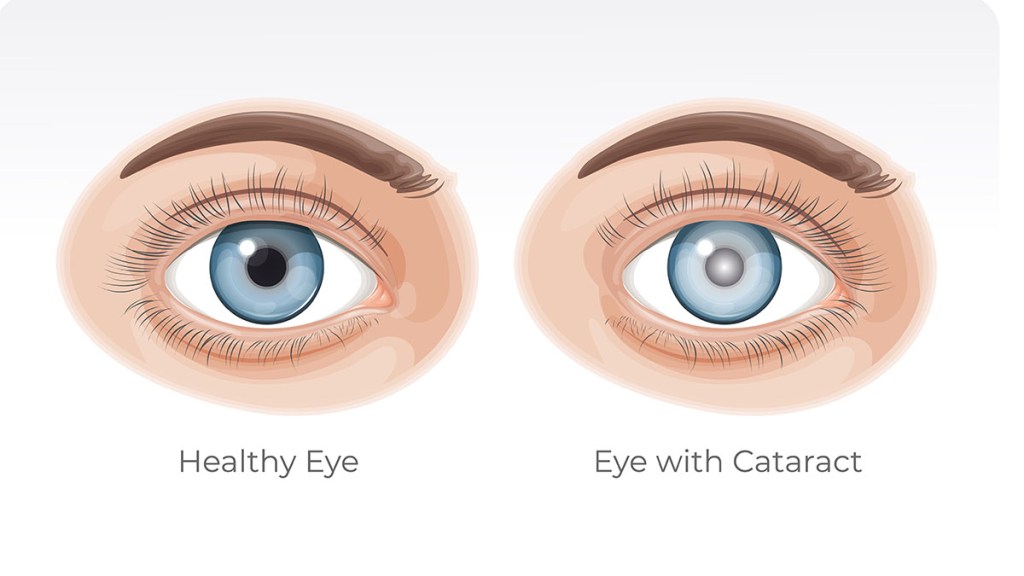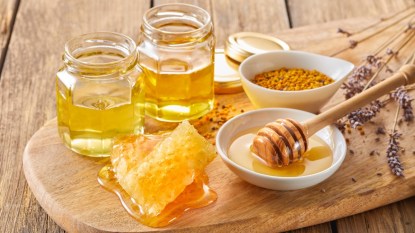Marigold Extract is ‘Supreme’ for Improved Eyesight, Says Top Eye Doc — How to Reap the Benefits
From soothing dry eye to warding off macular degeneration, this could be your eyes' new best friend

Growing up, you likely heard that carrots were the secret to keeping your eyes healthy — maybe you were even told they could help you see in the dark! But it turns out there’s another orange-hued superstar that’s the true secret to improved eyesight, and it has its roots in your garden! What is it? Marigold extract, which is also known as calendula.
What is marigold extract?
Marigold extract is a nutritional supplement that comes from the calendula plant. Calendula (Calendula oficialis) is a small shrub native to Southern Europe with bright orange or yellow flowers, and it’s been used since at least the 12th century for various medicinal purposes.
How marigold extract heals
Calendula contains several compounds called carotenoids, including lutein and zeaxanthin. Carotenoids give marigolds their bright color, but they also act as photoprotectors to protect the plant from getting damaged by the sun’s rays. Carotenoids also contain antioxidants, which fight damage caused by free radicals (harmful molecules that cause illness and aging).
The carotenoids in marigold extract can reduce all-body inflammation, relieve skin irritation and promote the body’s healing process. But they’re most beneficial for the eyes, says optometrist Marc Grossman, OD, LAC, co-author of Natural Eye Care: Your Guide to Healthy Vision and Healing and co-founder of Natural Eye Care in New Paltz, New York, who cheers, “Marigold extract is a supreme ingredient for improved eyesight and retinal support.”
5 benefits of marigold extract for eye health
“Compounds in marigold extract, specifically lutein and zeaxanthin, enhance eye health by protecting the eye cells from damaging blue light,” says Dr. Grossman (Click through for surprising info on the benefits of blue light glasses.)
Adds Brad Boyle, OD, an optometrist at Advanced Family Eye Care in Waterloo, Iowa, “Lutein and zeaxanthin help protect eye cells from being damaged and can also repair damaged cells. Specifically, they can potentially help reduce the incidence of macular degeneration and cataracts.” (Click through for more ways to prevent macular degeneration.) Read on for more eye health benefits.
1. May slow the progression of macular degeneration
Age-related macular degeneration (AMD) is one of the leading causes of age-related blindness, but marigold extract may help slow its progress.
One study, conducted by Japanese researchers and published in the journal Scientific Reports, found that a lutein-rich marigold extract helped protect vision in mouse models. Specifically, the extract reduced oxidative stress and tissue damage.
The scientists concluded that the lutein-rich extract could “show efficacy in patients with early AMD and in older people with an elevated risk of AMD, who may have already sustained some photo-induced oxidative stress and tissue damage.”
Another study, published in 2011, found that lutein and zeaxanthin helped prevent vision loss in people with late-stage AMD.
2. Helps reduce the risk of developing cataracts

Women are more likely to develop cataracts than men. Researchers aren’t entirely sure why, but it’s thought that the menopausal drop in estrogen may contribute. Once again, marigold extract may provide a line of defense.
A study published by Australian scientists found that people who didn’t get enough lutein or zeaxanthin in their diets were more likely to develop cataracts. These carotenoids are found in many fruits and vegetables, like kiwis, grapes and leafy green vegetables, but a calendula supplement can provide extra support. (Click through to see how lutein and zeaxanthin can also help improve night vision)
3. Relieves symptoms of dry eye
Women are twice as likely to suffer from dry eye disease than men. Women also experience more severe symptoms than men. To the rescue: marigold! A 2016 study, published in the Journal of Ophthalmology, found that lutein increased the secretion of IL-6, a growth factor produced by the eyes that helps combat inflammation. Since marigold extract contains up to 80% lutein, it may offer similar benefits.
In an animal study, scientists used an optimized marigold extract to test its effects on dry eye disease in a rat model. The calendula-based formula “improved tear secretion and the quality of tears” while reducing inflammation and oxidative stress.
“Dry eyes, a chronic and progressive issue, can be improved with supplements such as marigold extract to reduce inflammation,” Dr. Boyle says. “Since dry eye is also linked to eye infections, the antibacterial and antiviral properties in marigold extract can also reduce that risk.” (Click through to learn how another healing fruit extract, maqui berry, can benefit dry eye.)
4. Soothes inflamed eyelids
Blepharitis, or eyelid inflammation, occurs due to excess bacteria or eyelid dandruff (dead skin). While both sexes can develop blepharitis, staphylococcal (or bacterial blepharitis) is most common in women, accounting for about 80% of cases.
“Marigold extract can be a more natural way to treat blepharitis,” says Dr. Boyle. That’s because marigold increases blood flow, boosts collagen and speeds up the recovery process. In short, it optimizes the body’s ability to heal itself without many negative symptoms.”
5. Reduces pink eye symptoms
Herbalists and naturopaths have used marigold to treat pink eye, or conjunctivitis, for hundreds of years. Calendula won’t cure this type of infection, but its anti-inflammatory powers may reduce irritation and swelling and promote healing.
“Generally, we recommend supportive therapy for conjunctivitis, since the virus is self-limiting and typically lasts 1 to 7 days,” says Dr. Boyle, who adds, “I would recommend using marigold tea bags and compressing those on the eye. Remember, nothing that goes in the eye can be contaminated or it will make the infection worse.” Note: Don’t make an herbal tea compress for pink eye without talking to your doctor first.
Other uses for marigold extract
Marigold extract is regularly used to treat several health problems, including burns and wounds, bacterial vaginosis, eczema and diaper rash. If you want to use it for any of these purposes, speak with your healthcare provider first. She can alert you to the potential risks and make recommendations.
What is the best marigold extract supplement?
When it comes to supplements, Dr. Boyle recommends those manufactured by Eyepromise (buy from Eyepromise, $41.95). “Most of the supplements we supply for our patients are from this brand,” he explains. “Their calendula product is branded as lutein and zeaxanthin instead of marigold extract, but it’s the same thing.”
Other brands that Dr. Boyle endorses include PureBulk marigold flower extract, 5% (buy from PureBulk, $68.75) and, for a more affordable option, Zeaxanthin 4 mg with Lutein 10 mg (buy from Puritan, $10.79).
The dose you should take depends on several factors, including your weight, age and intended purpose, but Dr. Boyle suggests looking for a supplement that contains about 10 milligrams of lutein and at least 2 milligrams of zeaxanthin.
If you’re trying to achieve a specific outcome, like improved tear production or reduced eye irritation, talk to your doctor for more specific recommendations.
Side effects of marigold extract
Marigold extract is safe and presents few risks, but it’s normal to have mild side effects after taking the first dose or two of the supplement. “These side effects include mild stomachache, diarrhea or nausea,” Dr. Grossman says. “Symptoms typically improve quickly, but if they continue or worsen, visit your doctor.”
Dr. Boyle concurs, adding that “I think marigold extract is a very safe supplement, but you need to make sure you’re familiar with all of the ingredients. I would personally avoid using eye drops or eye washes, due to their risk of added irritation, but oral supplements and topicals are fine. For oral supplements, just make sure it’s NSF certified or has a similar rating for safety.”
Finally, avoid taking calendula if you take prescription painkillers or other heavy sedatives. “Marigold extract can interact with these drugs and cause dangerous breathing problems and drowsiness,” explains Dr. Boyle.
This content is not a substitute for professional medical advice or diagnosis. Always consult your physician before pursuing any treatment plan.













